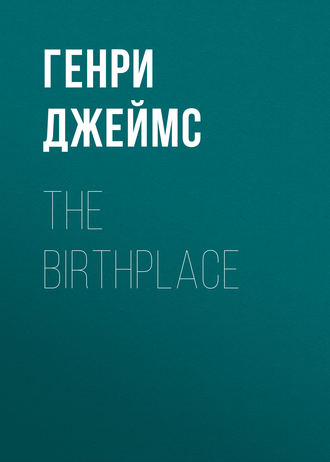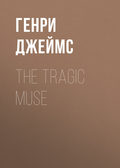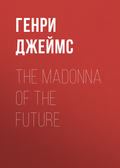
Генри Джеймс
The Birthplace
II
If the sweetness of the preliminary months had been great, great too, though almost excessive as agitation, was the wonder of fairly being housed with Him, of treading day and night in the footsteps He had worn, of touching the objects, or at all events the surfaces, the substances, over which His hands had played, which His arms, His shoulders had rubbed, of breathing the air—or something not too unlike it—in which His voice had sounded. They had had a little at first their bewilderments, their disconcertedness; the place was both humbler and grander than they had exactly prefigured, more at once of a cottage and of a museum, a little more archaically bare and yet a little more richly official. But the sense was strong with them that the point of view, for the inevitable ease of the connexion, patiently, indulgently awaited them; in addition to which, from the first evening, after closing-hour, when the last blank pilgrim had gone, the mere spell, the mystic presence—as if they had had it quite to themselves—were all they could have desired. They had received, at Grant-Jackson's behest and in addition to a table of instructions and admonitions by the number and in some particulars by the nature of which they found themselves slightly depressed, various little guides, manuals, travellers' tributes, literary memorials and other catch-penny publications; which, however, were to be for the moment swallowed up in the interesting episode of the induction or initiation appointed for them in advance at the hands of several persons whose relation to the establishment was, as superior to their own, still more official, and at those in especial of one of the ladies who had for so many years borne the brunt. About the instructions from above, about the shilling books and the well-known facts and the full-blown legend, the supervision, the subjection, the submission, the view as of a cage in which he should circulate and a groove in which he should slide, Gedge had preserved a certain play of mind; but all power of reaction appeared suddenly to desert him in the presence of his so visibly competent predecessor and as an effect of her good offices. He had not the resource, enjoyed by his wife, of seeing himself, with impatience, attired in black silk of a make characterised by just the right shade of austerity; so that this firm smooth expert and consummately respectable middle-aged person had him somehow, on the whole ground, completely at her mercy.
It was evidently something of a rueful moment when, as a lesson—she being for the day or two still in the field—he accepted Miss Putchin's suggestion of "going round" with her and with the successive squads of visitors she was there to deal with. He appreciated her method—he saw there had to be one; he admired her as succinct and definite; for there were the facts, as his wife had said at Blackport, and they were to be disposed of in the time; yet he felt a very little boy as he dangled, more than once, with Mrs. Gedge, at the tail of the human comet. The idea had been that they should by this attendance more fully embrace the possible accidents and incidents, so to put it, of the relation to the great public in which they were to find themselves; and the poor man's excited perception of the great public rapidly became such as to resist any diversion meaner than that of the admirable manner of their guide. It wandered from his gaping companions to that of the priestess in black silk, whom he kept asking himself if either he or Isabel could hope by any possibility ever remotely to resemble; then it bounded restlessly back to the numerous persons who revealed to him as it had never yet been revealed the happy power of the simple to hang upon the lips of the wise. The great thing seemed to be—and quite surprisingly—that the business was easy and the strain, which as a strain they had feared, moderate; so that he might have been puzzled, had he fairly caught himself in the act, by his recognising as the last effect of the impression an odd absence of the power really to rest in it, an agitation deep within him that vaguely threatened to grow. "It isn't, you see, so very complicated," the black silk lady seemed to throw off, with everything else, in her neat crisp cheerful way; in spite of which he already, the very first time—that is after several parties had been in and out and up and down—went so far as to wonder if there weren't more in it than she imagined. She was, so to speak, kindness itself—was all encouragement and reassurance; but it was just her slightly coarse redolence of these very things that, on repetition, before they parted, dimmed a little, as he felt, the light of his acknowledging smile. This again she took for a symptom of some pleading weakness in him—he could never be as brave as she; so that she wound up with a few pleasant words from the very depth of her experience. "You'll get into it, never fear—it will come; and then you'll feel as if you had never done anything else." He was afterwards to know that, on the spot, at this moment, he must have begun to wince a little at such a menace; that he might come to feel as if he had never done anything but what Miss Putchin did loomed for him, in germ, as a penalty to pay. The support she offered, none the less, continued to strike him; she put the whole thing on so sound a basis when she said: "You see they're so nice about it—they take such an interest. And they never do a thing they shouldn't. That was always every thing to mother and me." "They," Gedge had already noticed, referred constantly and hugely, in the good woman's talk, to the millions who shuffled through the house; the pronoun in question was for ever on her lips, the hordes it represented filled her consciousness, the addition of their numbers ministered to her glory. Mrs. Gedge promptly fell in. "It must be indeed delightful to see the effect on so many and to feel that one may perhaps do something to make it—well, permanent." But he was kept silent by his becoming more sharply aware that this was a new view, for him, of the reference made, that he had never thought of the quality of the place as derived from Them, but from Somebody Else, and that They, in short, seemed to have got into the way of crowding Him out. He found himself even a little resenting this for Him—which perhaps had something to do with the slightly invidious cast of his next inquiry.
"And are They always, as one might say—a—stupid?"
"Stupid!" She stared, looking as if no one could be such a thing in such a connexion. No one had ever been anything but neat and cheerful and fluent, except to be attentive and unobjectionable and, so far as was possible, American.
"What I mean is," he explained, "is there any perceptible proportion that take an interest in Him?"
His wife stepped on his toe; she deprecated levity.
But his mistake fortunately was lost on their friend.
"That's just why they come, that they take such an interest. I sometimes think they take more than about anything else in the world." With which Miss Putchin looked about at the place. "It is pretty, don't you think, the way they've got it now?" This, Gedge saw, was a different "They"; it applied to the powers that were—the people who had appointed him, the governing, visiting Body, in respect to which he was afterwards to remark to Mrs. Gedge that a fellow—it was the difficulty—didn't know "where to have her." His wife, at a loss, questioned at that moment the necessity of having her anywhere, and he said, good-humouredly, "Of course; it's all right." He was in fact content enough with the last touches their friend had given the picture. "There are many who know all about it when they come, and the Americans often are tremendously up. Mother and me really enjoyed"—it was her only slip—"the interest of the Americans. We've sometimes had ninety a day, and all wanting to see and hear everything. But you'll work them off; you'll see the way—it's all experience." She came back for his comfort to that. She came back also to other things: she did justice to the considerable class who arrived positive and primed. "There are those who know more about it than you do. But that only comes from their interest."
"Who know more about what?" Gedge inquired.
"Why about the place. I mean they have their ideas—of what everything is, and where it is, and what it isn't and where it should be. They do ask questions," she said, yet not so much in warning as in the complacency of being herself seasoned and sound; "and they're down on you when they think you go wrong. As if you ever could! You know too much," she astutely smiled; "or you will."
"Oh you mustn't know too much, must you?" And Gedge now smiled as well. He knew, he thought, what he meant.
"Well, you must know as much as anybody else. I claim at any rate that I do," Miss Putchin declared. "They never really caught me out."
"I'm very certain of that"—and Mrs. Gedge had an elation almost personal.
"Surely," he said, "I don't want to be caught out." She rejoined that in such a case he would have Them down on him, and he saw that this time she meant the powers above. It quickened his sense of all the elements that were to reckon with, yet he felt at the same time that the powers above were not what he should most fear. "I'm glad," he observed, "that they ever ask questions; but I happened to notice, you know, that no one did to-day."
"Then you missed several—and no loss. There were three or four put to me too silly to remember. But of course they mostly are silly."
"You mean the questions?"
She laughed with all her cheer. "Yes, sir; I don't mean the answers."
Whereupon, for a moment snubbed and silent, he felt like one of the crowd. Then it made him slightly vicious. "I didn't know but you meant the people in general—till I remembered that I'm to understand from you that they're wise, only occasionally breaking down."
It wasn't really till then, he thought, that she lost patience; and he had had, much more than he meant no doubt, a cross-questioning air. "You'll see for yourself." Of which he was sure enough. He was in fact so ready to take this that she came round to full accommodation, put it frankly that every now and then they broke out—not the silly, oh no, the intensely inquiring. "We've had quite lively discussions, don't you know, about well-known points. They want it all their way, and I know the sort that are going to as soon as I see them. That's one of the things you do—you get to know the sorts. And if it's what you're afraid of—their taking you up," she was further gracious enough to say, "you needn't mind a bit. What do they know, after all, when for us it's our life? I've never moved an inch, because, you see, I shouldn't have been here if I didn't know where I was. No more will you be a year hence—you know what I mean, putting it impossibly—if you don't. I expect you do, in spite of your fancies." And she dropped once more to bed-rock. "There are the facts. Otherwise where would any of us be? That's all you've got to go upon. A person, however cheeky, can't have them his way just because he takes it into his head. There can only be one way, and," she gaily added as she took leave of them, "I'm sure it's quite enough!"
III
Gedge not only assented eagerly—one way was quite enough if it were the right one—but repeated it, after this conversation, at odd moments, several times over to his wife. "There can only be one way, one way," he continued to remark—though indeed much as if it were a joke; till she asked him how many more he supposed she wanted. He failed to answer this question, but resorted to another repetition. "There are the facts, the facts," which perhaps, however, he kept a little more to himself, sounding it at intervals in different parts of the house. Mrs. Gedge was full of comment on their clever introductress, though not restrictively save in the matter of her speech, "Me and mother," and a general tone—which certainly was not their sort of thing. "I don't know," he said, "perhaps it comes with the place, since speaking in immortal verse doesn't seem to come. It must be, one seems to see, one thing or the other. I daresay that in a few months I shall also be at it—'me and the wife.'"
"Why not 'me and the missus' at once?" Mrs. Gedge resentfully inquired. "I don't think," she observed at another time, "that I quite know what's the matter with you."
"It's only that I'm excited, awfully excited—as I don't see how one can't be. You wouldn't have a fellow drop into this berth as into an appointment at the Post Office. Here on the spot it goes to my head—how can that be helped? But we shall live into it, and perhaps," he said with an implication of the other possibility that was doubtless but part of his fine ecstasy, "we shall live through it." The place acted on his imagination—how, surely, shouldn't it? And his imagination acted on his nerves, and these things together, with the general vividness and the new and complete immersion, made rest for him almost impossible, so that he could scarce go to bed at night and even during the first week more than once rose in the small hours to move about, up and down, with his lamp—standing, sitting, listening, wondering, in the stillness, as if positively to recover some echo, to surprise some secret, of the genius loci. He couldn't have explained it—and didn't in fact need to explain it, at least to himself, since the impulse simply held him and shook him; but the time after closing, the time above all after the people—Them, as he felt himself on the way habitually to put it, predominant, insistent, all in the foreground—brought him, or ought to have brought him, he seemed to see, nearer to the enshrined Presence, enlarging the opportunity for communion and intensifying the sense of it. These nightly prowls, as he called them, were disquieting to his wife, who had no disposition to share in them, speaking with decision of the whole place as just the place to be forbidding after dark. She rejoiced in the distinctness, contiguous though it was, of their own little residence, where she trimmed the lamp and stirred the fire and heard the kettle sing, repairing the while the omissions of the small domestic who slept out; she foresaw her self, with some promptness, drawing rather sharply the line between her own precinct and that in which the great spirit might walk. It would be with them, the great spirit, all day—even if indeed on her making that remark, and in just that form, to her husband, he replied with a queer "But will he though?" And she vaguely imaged the development of a domestic antidote after a while, precisely, in the shape of curtains more markedly drawn and everything most modern and lively, tea, "patterns," the newspapers, the female fiction itself that they had reacted against at Blackport, quite defiantly cultivated.
These possibilities, however, were all right, as her companion said it was, all the first autumn—they had arrived at summer's end; and he might have been more than content with a special set of his own that he had access to from behind, passing out of their low door for the few steps between it and the Birthplace. With his lamp ever so carefully guarded and his nursed keys that made him free of treasures, he crossed the dusky interval so often that she began to qualify it as a habit that "grew." She spoke of it almost as if he had taken to drink, and he humoured that view of it by allowing the cup to be strong. This had been in truth altogether his immediate sense of it; strange and deep for him the spell of silent sessions before familiarity and, to some small extent, disappointment had set in. The exhibitional side of the establishment had struck him, even on arrival, as qualifying too much its character; he scarce knew what he might best have looked for, but the three or four rooms bristled overmuch, in the garish light of day, with busts and relics, not even ostensibly always His, old prints and old editions, old objects fashioned in His likeness, furniture "of the time" and autographs of celebrated worshippers. In the quiet hours and the deep dusk, none the less, under the play of the shifted lamp and that of his own emotion, these things too recovered their advantage, ministered to the mystery, or at all events to the impression, seemed consciously to offer themselves as personal to the poet. Not one of them was really or unchallengeably so, but they had somehow, through long association, got, as Gedge always phrased it, into the secret, and it was about the secret he asked them while he restlessly wandered. It wasn't till months had elapsed that he found how little they had to tell him, and he was quite at his ease with them when he knew they were by no means where his sensibility had first placed them. They were as out of it as he; only, to do them justice, they had made him immensely feel. And still, too, it was not they who had done that most, since his sentiment had gradually cleared itself to deep, to deeper refinements.
The Holy of Holies of the Birthplace was the low, the sublime Chamber of Birth, sublime because, as the Americans usually said—unlike the natives they mostly found words—it was so pathetic; and pathetic because it was—well, really nothing else in the world that one could name, number or measure. It was as empty as a shell of which the kernel has withered, and contained neither busts nor prints nor early copies; it contained only the Fact—the Fact itself—which, as he stood sentient there at midnight, our friend, holding his breath, allowed to sink into him. He had to take it as the place where the spirit would most walk and where He would therefore be most to be met, with possibilities of recognition and reciprocity. He hadn't, most probably—He hadn't—much inhabited the room, as men weren't apt, as a rule, to convert to their later use and involve in their wider fortune the scene itself of their nativity. But as there were moments when, in the conflict of theories, the sole certainty surviving for the critic threatened to be that He had not—unlike other successful men—not been born, so Gedge, though little of a critic, clung to the square feet of space that connected themselves, however feebly, with the positive appearance. He was little of a critic—he was nothing of one; he hadn't pretended to the character before coming, nor come to pretend to it; also, luckily for him, he was seeing day by day how little use he could possibly have for it. It would be to him, the attitude of a high expert, distinctly a stumbling-block, and that he rejoiced, as the winter waned, in his ignorance, was one of the propositions he betook himself, in his odd manner, to enunciating to his wife. She denied it, for hadn't she in the first place been present, wasn't she still present, at his pious, his tireless study of everything connected with the subject?—so present that she had herself learned more about it than had ever seemed likely. Then in the second place he wasn't to proclaim on the house-tops any point at which he might be weak, for who knew, if it should get abroad that they were ignorant, what effect might be produced?–
"On the attraction"—he took her up—"of the Show?"
He had fallen into the harmless habit of speaking of the place as the "Show"; but she didn't mind this so much as to be diverted by it. "No; on the attitude of the Body. You know they're pleased with us, and I don't see why you should want to spoil it. We got in by a tight squeeze—you know we've had evidence of that, and that it was about as much as our backers could manage. But we're proving a comfort to them, and it's absurd of you to question your suitability to people who were content with the Putchins."
"I don't, my dear," he returned, "question any thing; but if I should do so it would be precisely because of the greater advantage constituted for the Putchins by the simplicity of their spirit. They were kept straight by the quality of their ignorance—which was denser even than mine. It was a mistake in us from the first to have attempted to correct or to disguise ours. We should have waited simply to become good parrots, to learn our lesson—all on the spot here, so little of it is wanted—and squawk it off."
"Ah 'squawk,' love—what a word to use about Him!"
"It isn't about Him—nothing's about Him. None of Them care tuppence about Him. The only thing They care about is this empty shell—or rather, for it isn't empty, the extraneous preposterous stuffing of it."
"Preposterous?"—he made her stare with this as he hadn't yet done.
At sight of her look, however—the gleam, as it might have been, of a queer suspicion—he bent to her kindly and tapped her cheek. "Oh it's all right. We must fall back on the Putchins. Do you remember what she said?—'They've made it so pretty now.' They have made it pretty, and it's a first-rate show. It's a first-rate show and a first-rate billet, and He was a first-rate poet, and you're a first-rate woman—to put up so sweetly, I mean, with my nonsense."
She appreciated his domestic charm and she justified that part of his tribute which concerned herself. "I don't care how much of your nonsense you talk to me, so long as you keep it all for me and don't treat Them to it."
"The pilgrims? No," he conceded—"it isn't fair to Them. They mean well."
"What complaint have we after all to make of Them so long as They don't break off bits—as They used, Miss Putchin told us, so awfully—in order to conceal them about Their Persons? She broke Them at least of that."







